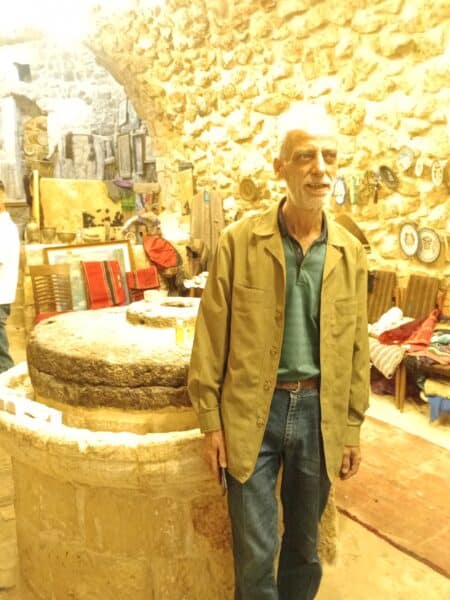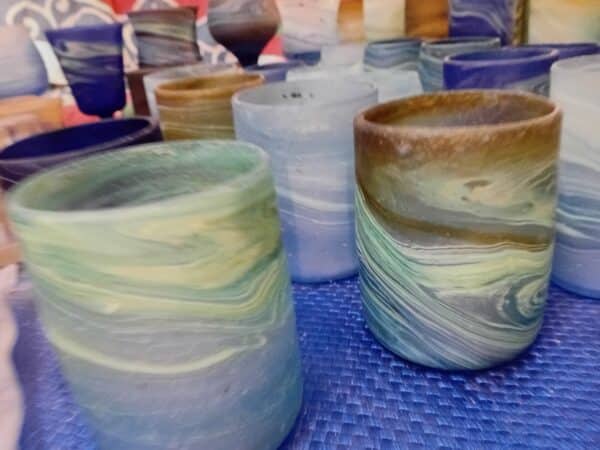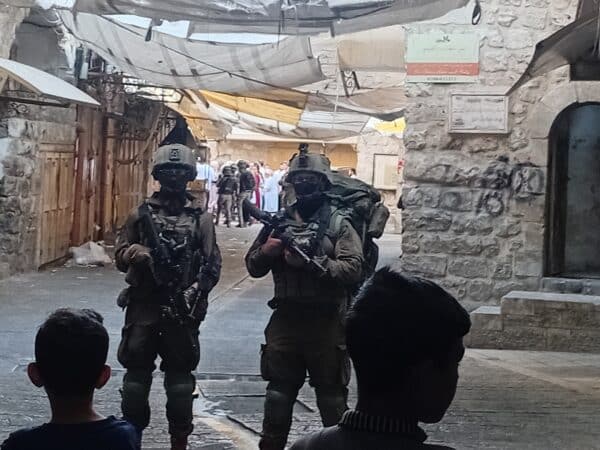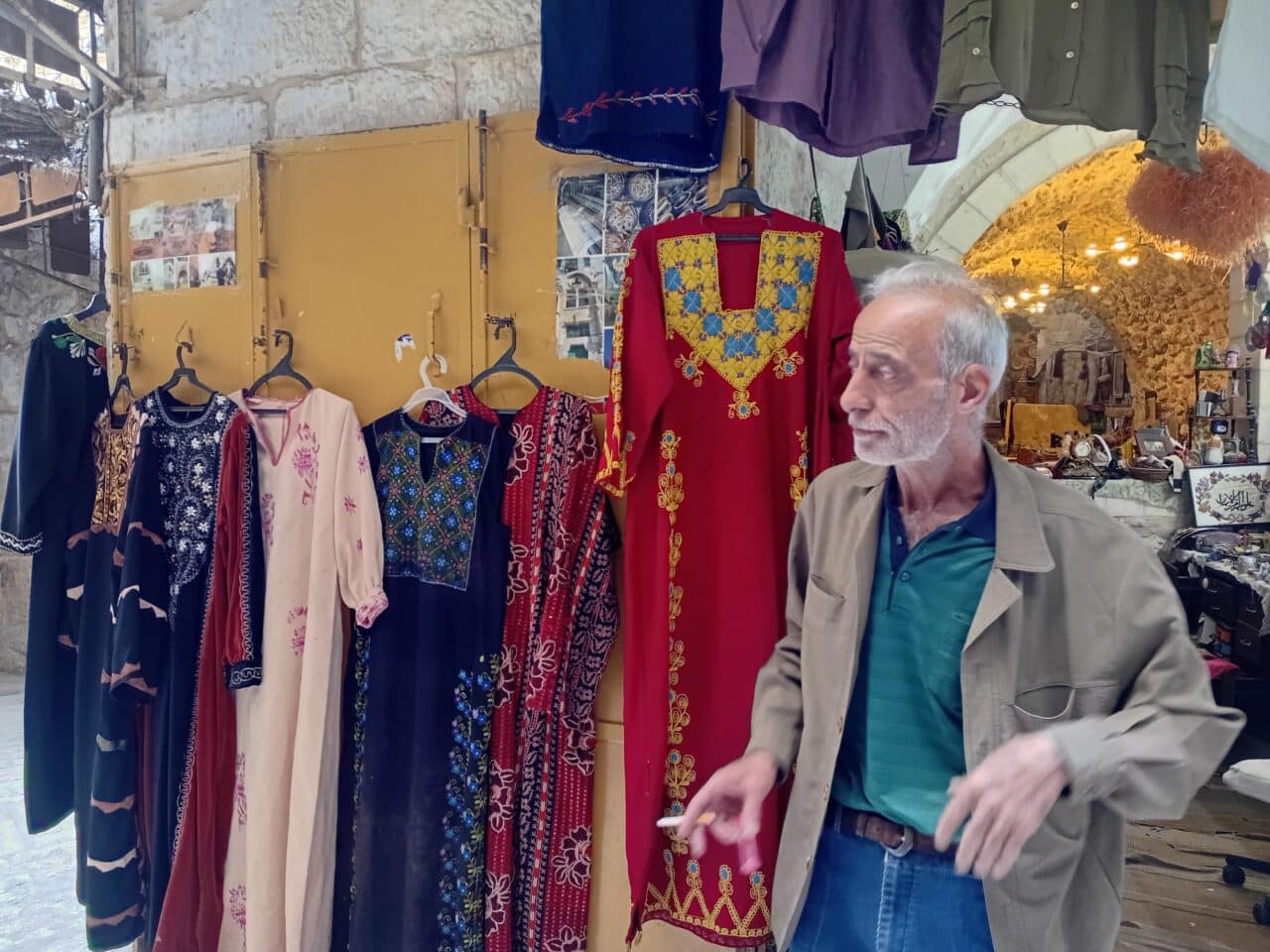Rooted in History, Al-Khalil Under Attack
Standing in the center of the shop in the Old City of Hebron, known as Al Khalil to Palestinians, stands a 300-year old sesame press. Hisham, the shop owner, lights up when we ask him to talk about its history.
Hisham shows us a photo from when the press was in use and operated by camels, and points out the various parts of the building that were used to process the sesame seed into various products – from oil to tahini to something like halwa, the sweet dessert so well-loved in the area. Before the sesame press was in the building, however, possibly even as long as 800 years ago under the Ottoman Empire, olive oil was made there. Standing there in the presence of such history, I feel the immensity of what it means to try and keep this history – these stories in place – alive.
After studying in England and working as a dental engineer, Hisham came home in 2014, when the Hebron Rehabilitation Committee offered to restore the old stone building to once again be a destination for tourism and culture. “If the HRC was going to restore this shop, my father wanted to make sure one of his sons was here to run it. I was the obvious choice.”

Hisham shows us a display of gorgeous blown and painted glass for sale. Back in the 1980s, he tells us, they would take the glass blown in Hebron and drive it to their friends, relatives, and colleagues in Gaza to be painted. “It would take just under an hour,” he says. Since the increasing enclosures of the West Bank and Gaza Strip, however, that routine changed drastically in the last 25 years. “We had to take the blown glass to the border of the West Bank in one car, then go through a checkpoint with all of our materials and transfer them into another car in order to drive through Israel. Then we’d do the same when we got to Gaza.”
Since October 2023, however, all of that movement and exchange of craftsmanship has stopped. The blown and painted glass for sale in the shop is all old, and people in the West Bank and Gaza Strip remain trapped in place by the cruel Zionist project of colonization and military occupation.
Although Hisham continues to open his shop every morning and greet people all day with an “Ahlan wa Sahlan – Welcome!” he struggles to make a living. Like most of the stores in the once bustling Old City, there are more and more days that Hisham’s shop remains completely empty, and isn’t even visited by one single customer. Hisham, as well as all of those who stay to run their shops, do so not only as an act of resistance to their own ethnic cleansing but also out of a deep love for their homeland.
Hisham is just one of the shop keepers we have been asked to visit on Saturday evenings, during the weekly invasion of illegal Israeli settlers and international Jewish visitors – many from the U.S. – who have come to tour the old city. For the last fifteen or so years, starting at around 4 or 5 pm, dozens of heavily armed Israeli soldiers and their APCs (armored personnel carriers) clear the streets of Palestinians and international journalists. Between one and three soldiers armed with live ammunition for every Jewish tourist force Palestinians to close their shops or wait out the scenes of violence.

During one such terrifying invasion, our own team witnessed a soldier harassing an old man and his 2-year-old grandson. The soldier forced the 2-year-old from his tricycle and then drop-kicked the bike across the street. The grandfather asked us to send him the video we took of the abuse, hoping a complaint could be made somewhere. Sadly, the complaint will almost definitely go nowhere. Another shopkeeper we have befriended showed us the damage done to his son’s car from one of the APCs, but when he has complained in the past, he was told by the illegal settlers, “If you complain, next time I will do the same damage to your face.”
Every morning here, we wake to learn of the many nightly bombings and invasions that have taken place by the Israeli military in Palestinian neighborhoods, towns, refugee camps, and villages across the West Bank, some of them nearby. Such violence and destruction continue to force people into poverty. Children continue to beg us for money, and shopkeepers are desperate to have us into their empty shops to purchase their wares.
It is clear that the Israeli military, led by its government, is determined to continue their practices of utter brutality until they gain complete control over all of the land here, and that they are willing to use consistent violence and dehumanizing tactics to get what they want. It is hard to sustain hope that a just peace will ever be possible.


